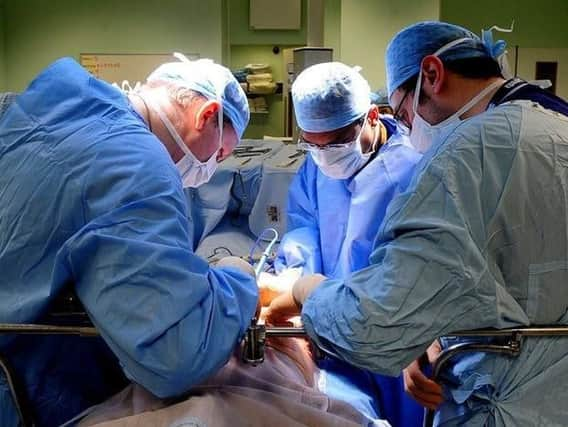Hundreds of Wigan operations axed despite overall cancellation rate dropping


But borough health chiefs pointed out today that, despite extreme pressures, they have actually brought these figures down.
Doctors warn that delays to surgery can cause harm to patients, and are calling for extra hospital beds to be provided across England.
Advertisement
Hide AdAdvertisement
Hide AdWrightington, Wigan and Leigh NHS Foundation Trust (WWL) cancelled a total of 192 non-urgent operations, such as hip or knee surgeries, for non-clinical reasons in the last three months of 2018, the latest period covered by NHS England data.
Cancellations were down overall across England compared to last year, but the Royal College of Surgeons said this would be little comfort to patients whose procedures were called off.
A spokeswoman for the RCS said: “Recent NHS data shows that January saw the worst A&E performance on record. It is inevitable that this pressure on A&E will have a knock-on effect for bed capacity - and therefore on planned surgery - during the coming months.
“The RCS strongly believes that the NHS needs to commit to increasing hospital bed capacity. Without extra beds, we fear hospitals will struggle to properly tackle long waits for surgery.”
Advertisement
Hide AdAdvertisement
Hide AdA last-minute cancellation is defined as being either on the day that a patient was due to arrive, after the patient has arrived, or on the day of the operation itself.
The RCS has warned that the drop in last-minute cancellations could be masking the fact that more operations are simply being cancelled in advance.
According to the NHS Constitution, trusts must offer a new date within a maximum period of 28 days after a non-urgent operation has been cancelled.
If they are unable to do so, they must instead fund the treatment with another hospital and forfeit payment from the NHS Clinical Commissioning Group that funds healthcare in the area.
Advertisement
Hide AdAdvertisement
Hide AdAt WWL, three per cent of operations were not rescheduled within that period.
There were 20,145 last minute cancellations across England in the three monts to December, a slight fall on the same period last year.
More than 1,660 of these patients - eight per cent of the total - did not have their operations rescheduled within 28 days.
This proportion is the highest it has been for this three month period in 14 years.
Advertisement
Hide AdAdvertisement
Hide AdA WWL spokeswoman said: “A total of 192 elective operations were cancelled at the last minute in quarter three at Wrightington, Wigan and Leigh NHS Foundation Trust. This is a 5.4 per cent drop from the previous quarter and 13.5 per cent drop from the same quarter in the previous year.
“Despite significant pressure, in England fewer than one per cent of operations are postponed on the day, and nurses, doctors and NHS leaders across the country are also rightly prioritising emergency patients over winter.
“At WWL the main reasons for cancelling operations are bed shortages; lack of theatre time; and emergency case prioritisation
“These are the main operational issues WWL faces daily however, the main reason for on-the-day cancellations is a lack of beds and associated out of theatre time whilst staff either try to find a bed, or as a result of delay in being able to either discharge back from theatre, recover a patient to a ward or being able to call the patient whilst we wait for a bed to come available.
Advertisement
Hide AdAdvertisement
Hide Ad“These scenarios arise when the hospital is under extreme pressure through the number of acutely ill patients in beds or the number of attendances through A&E.
“In order to reduce last minute cancellations due to beds, WWL decided, and was later followed-up nationally, to not operate on routine patients that required an overnight bed and focus on day cases and our most acutely ill patients.
This has proven to be extremely successful although waiting times for some of our routine patients has increased.
“Waiting for surgery is a very stressful and worrying time for patients and their families, and such long waits are simply unacceptable”, the RCS spokeswoman continued.
“The longer patients wait, the more risk there is that their conditions may deteriorate.”